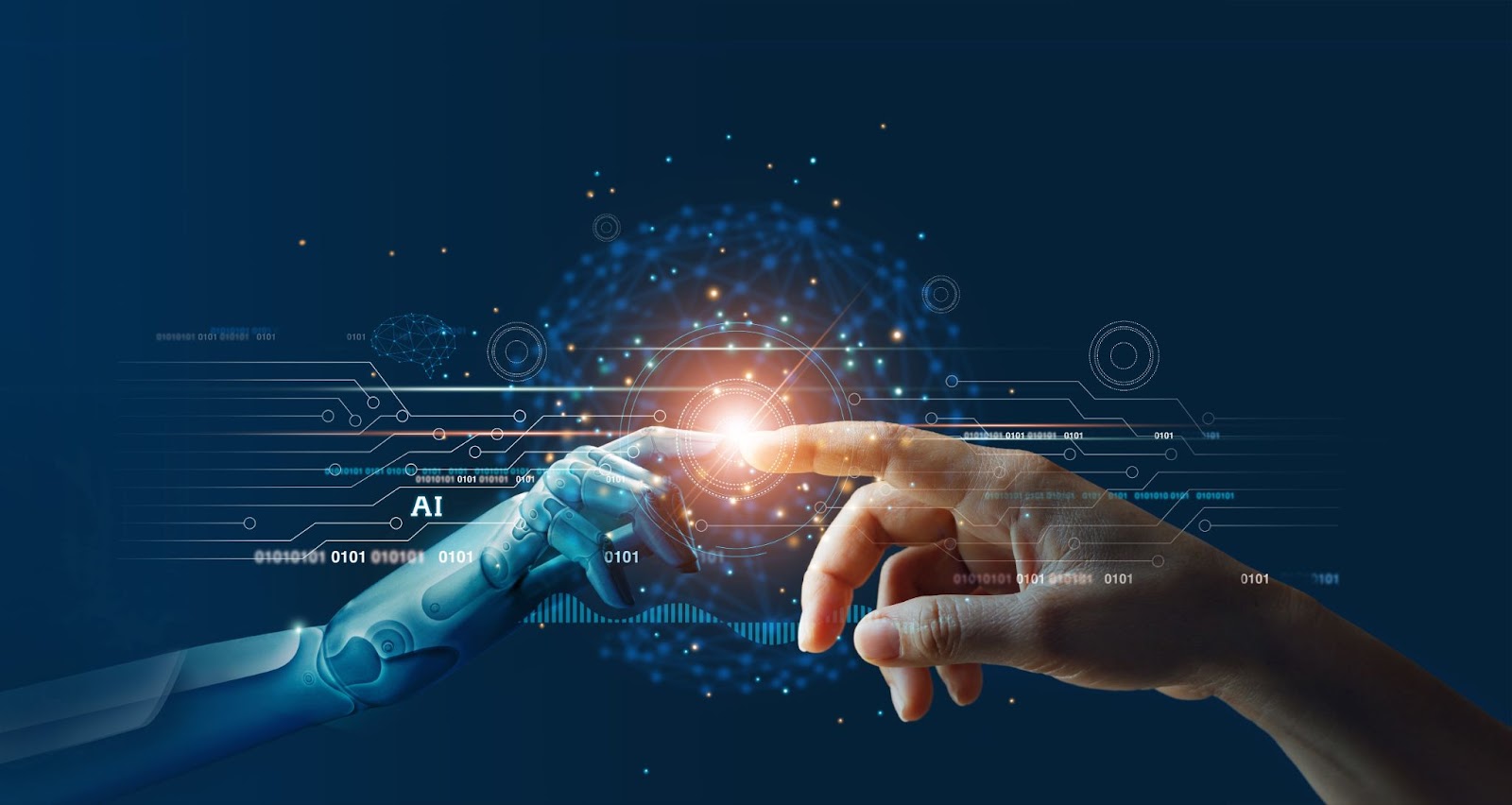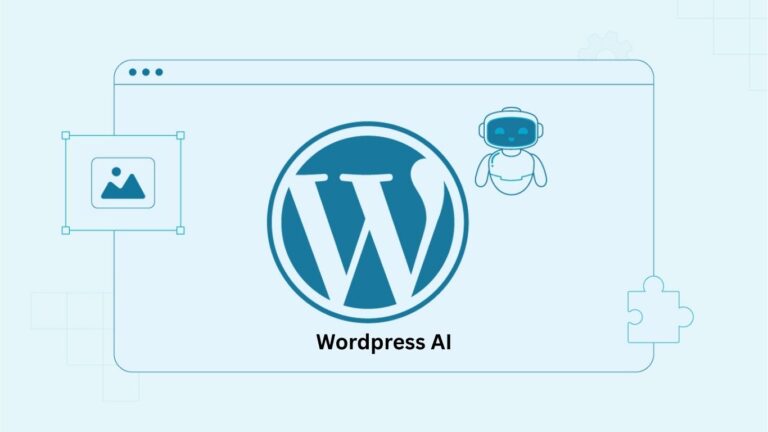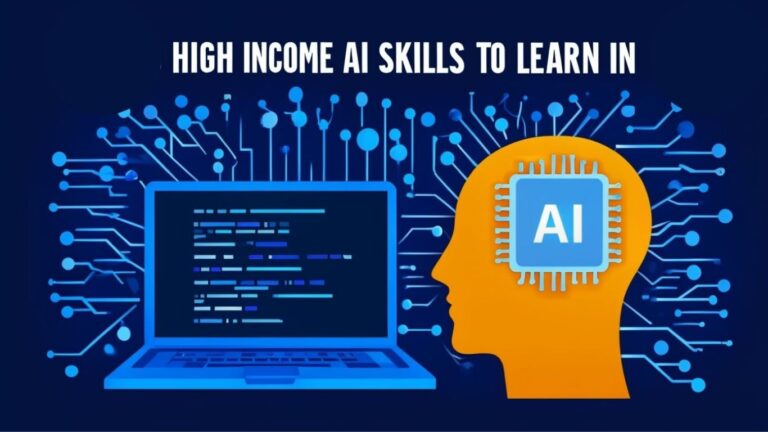Today’s consumers are constantly connected, switching between apps, emails, and websites-often from a mobile device. With this shift, marketers face one big challenge: delivering personalized experiences at scale.
That’s where AI in marketing is making an impact.
Marketers now use AI to analyze real-time behavior, segment audiences more precisely, personalize email campaigns, and even generate ad copy-all without slowing down. Whether it’s identifying buying intent or automating responses, AI for marketers means faster decisions and better results.
This blog will explore how businesses are using personalized marketing AI to:
- Understand customers through behavior and data
- Create one-to-one messaging at scale
- Automate repetitive tasks with marketing automation AI
What Is AI in Marketing?
AI in marketing refers to using artificial intelligence tools to streamline, optimize, and personalize the entire marketing funnel-from audience targeting to campaign execution.
Instead of relying on assumptions, AI-powered marketing tools process real-time data to:
- Track customer behavior across channels
- Recommend content or products based on intent
- Trigger automated campaigns with higher accuracy
Why It Matters for Mobile Marketing
Mobile users expect seamless, relevant experiences. AI can detect location, app behavior, and browsing patterns to personalize offers on the go-boosting mobile conversions and retention.
Key Technologies Behind AI Marketing:
- Machine Learning (ML): Predicts customer actions like churn, purchases, or engagement time.
- Natural Language Processing (NLP): Powers chatbots, product descriptions, and email subject lines.
- Predictive Analytics: Suggests the best time to send campaigns or promote offers.
For modern brands, AI for marketers isn’t optional-it’s essential for delivering data-driven personalization and automated growth across every touchpoint.
Gaining Deep AI Customer Insights
Understanding your customers is the foundation of effective marketing-but doing it at scale, across millions of data points, is where AI customer insights shine.
How AI Understands Your Customers
Traditional analytics only scratch the surface. AI in marketing goes much deeper by analyzing:
- Purchase history: What customers buy, how often, and when.
- Online behavior: Pages visited, time on site, cart abandonment patterns.
- Social signals: Sentiment from reviews, social media mentions, and engagement trends.
By connecting these data points, AI can predict:
- Which products a user is likely to buy next
- When they’re most likely to convert
- What content or offer will resonate best
This is more than segmentation-AI customer insights help you deliver true personalization in real time.
Tools That Provide Real-Time AI Customer Insights
Marketers no longer need to guess what their audience wants. Several platforms now use AI to deliver actionable insights instantly:
- Salesforce Einstein: Uses predictive AI to score leads, forecast sales, and suggest next-best actions for engagement.
- Adobe Sensei: Analyzes user journeys across channels to personalize content and product recommendations.
- HubSpot AI: Surfaces behavioral insights, lead scoring, and content suggestions automatically.
- Segment + Twilio AI: Unifies customer data and applies machine learning for smarter user profiling.
These tools don’t just analyze the past-they predict what’s next, giving marketers a competitive edge.
Mobile Insight in Real Time
AI can track mobile user behavior-like app opens, push notification interactions, and location data-to personalize mobile campaigns instantly. It’s no longer about reacting to data; it’s about acting while the customer is still engaged.
Audience Segmentation at Scale
Segmentation isn’t new—but AI takes it to an entirely new level. Traditional methods rely on static attributes like age, location, or job title. While useful, this approach often misses the deeper context: intent, behavior, and timing.
This is where AI in marketing completely changes the game.
Traditional Segmentation vs. AI-Powered Segmentation
| Traditional Segmentation | AI-Powered Segmentation |
|---|---|
| Based on demographics or basic firmographics | Based on real-time behavior, engagement, and predictive scores |
| Static (set once, updated rarely) | Dynamic and continuously updated |
| Manual and time-consuming | Automated and scalable |
AI can segment customers by:
- Likelihood to purchase in the next 7 days
- Churn risk based on recent behavior
- Content preferences based on browsing patterns
- Device usage (e.g., mobile-first buyers)
For AI for marketers, this means your segments are always fresh and relevant-allowing for hyper-targeted messaging.
Dynamic Customer Profiles & Predictive Segmentation
AI builds evolving profiles by aggregating:
- Web and app behavior
- Purchase and engagement history
- Time of day preferences
- Device and platform data
These profiles help marketing teams trigger real-time personalization-whether that’s a mobile push notification, a personalized email, or an in-app offer tailored to the moment.
Example: A mobile commerce app might use AI to create a segment like “iOS users who viewed running shoes 3+ times this week but haven’t purchased”-and automatically trigger a discount notification.
Proof That It Works: A Real-World Stat
A Salesforce report found that marketers using AI-powered segmentation saw a 25% increase in conversion rates compared to traditional rule-based segmentation.
That’s not a small lift-it’s the difference between flatlining and scaling.
Personalized Marketing Campaigns with AI
Generic marketing is dead. Today’s consumers expect messaging that feels like it was crafted just for them-and personalized marketing AI makes that not only possible, but scalable.
Using AI, marketers can deliver hyper-relevant content, offers, and experiences across every channel, in real time.
How AI Powers Personalization Across Channels
AI doesn’t just personalize based on a name-it adapts messaging based on behavior, context, and predicted intent. Here’s how:
1. Personalized Email Subject Lines & Content
AI tools like Phrasee use natural language generation to create subject lines that match a user’s tone preferences, past interactions, and likelihood to engage.
Example:
Instead of “Don’t miss our fall sale,” AI might send:
“Alex, your weekend sneaker deal is ready ” – if Alex had browsed shoes multiple times that week.
2. AI-Generated Product Recommendations
Platforms like Mailchimp AI and Shopify Magic analyze purchase behavior to recommend products tailored to individual customers. These recommendations are used in:
- Cart abandonment emails
- Product recommendation blocks on landing pages
- Push notifications or in-app messages
Result: Higher click-through rates, lower cart drop-offs, and increased average order value.
3. Dynamic Landing Pages
Personalized marketing AI can also modify landing page content in real time based on:
- Traffic source (e.g., social ad vs. email)
- Location
- Previous browsing behavior
Tools like Unbounce Smart Traffic use AI to send users to the highest-converting version of a page, adapting content to each visitor segment automatically.
AI Tools for Personalized Marketing
- Persado: AI-powered emotional language to optimize email, SMS, and social copy.
- Phrasee: Generates and tests language that resonates with specific audience segments.
- Mailchimp AI: Automates content suggestions and personalized recommendations in campaigns.
Why It Matters for Mobile Campaigns
With most users opening emails and browsing on mobile, personalized marketing AI ensures that messaging is timely, relevant, and optimized for short attention spans. From subject lines to product carousels, every detail is dynamically tailored for mobile engagement.
AI in Content Creation and Copywriting
Creating high-converting content used to take hours of brainstorming, drafting, and editing. Now, AI for marketers is speeding up the process while improving precision and performance.
Thanks to natural language generation (NLG), AI can now write everything from blog intros to ad copy—at scale and with surprising effectiveness.
What AI Can Write Today
With the right prompts and context, AI tools can generate:
- Ad copy for Google, Facebook, and Instagram ads
- Product descriptions tailored to different personas or markets
- Email subject lines and preview text
- Landing page headers and CTAs
- SEO-optimized blog intros and outlines
This isn’t about replacing human creativity—it’s about enhancing it. Marketers can generate multiple content variations, test them, and iterate faster than ever before.
Tools Driving AI Content Creation
- Jasper: Great for long-form content, email copy, and ad campaigns. Allows marketers to set tone, style, and format.
- Copy.ai: Offers quick templates for product descriptions, social media posts, and sales emails.
- ChatGPT for marketers: Ideal for rapid ideation, editing, A/B test variants, and tone adjustments on the fly.
These tools reduce manual work while giving marketers full control over voice and messaging.
Key Benefits for Marketers
- Speed: Generate content in seconds instead of hours.
- A/B Testing at Scale: Test dozens of copy variations automatically to find what converts.
- Tone & Brand Control: Adjust style to fit different audiences, campaigns, or platforms.
Example: A mobile-first ecommerce brand can use AI-generated ad copy to target new users with urgency-driven language, while showing returning users loyalty-driven offers-all automatically personalized.
Mobile Content Creation Matters
Since much of your audience is reading on a phone, AI for marketers can optimize headlines and CTAs for shorter attention spans and smaller screens. Smart copy, shorter sentences, and emotional triggers are all fine-tuned for mobile success.
Marketing Automation AI: Smarter Campaign Management
Running effective marketing campaigns across multiple channels-email, social, search, and mobile-can be overwhelming. That’s where marketing automation AI steps in, turning manual, time-consuming tasks into streamlined, data-driven workflows.
Instead of manually scheduling emails or guessing which ad variant works best, AI handles the heavy lifting-optimizing in real time based on performance and behavior.
Smarter A/B Testing Without the Guesswork
Traditional A/B testing can be slow, requiring weeks to gather data. Marketing automation AI runs multi-variant testing in real time, continuously learning and adjusting:
- Chooses the best-performing subject lines or creatives automatically
- Adapts content based on device, time of day, and user behavior
- Scales successful variations across audiences
Example: An AI-powered tool like Optimizely can test 5 different versions of a mobile landing page and shift traffic dynamically toward the top performer.
Budget Optimization That Thinks for You
AI doesn’t just manage spend-it allocates budget dynamically across platforms based on ROI. Tools like Google Performance Max and Meta Advantage+ use machine learning to automatically:
- Shift ad spend from underperforming audiences to high-converting ones
- Optimize for conversion, clicks, or ROAS based on campaign goals
- Forecast budget impact before deployment
This level of automation helps marketers maximize return-without needing to babysit every campaign.
Real-Time Campaign Triggers
Marketing automation AI enables real-time personalization based on user behavior. Examples:
- Abandoned cart → Trigger SMS within 10 minutes
- Inactive app user → Send re-engagement push notification
- New site visit → Display personalized CTA banner based on referral source
These triggers are dynamic and constantly updated-delivering the right message at the right time, often within seconds.
Multi-Channel Orchestration Made Simple
AI connects the dots across platforms. Whether your customer starts on mobile, switches to desktop, then checks email later-marketing automation AI ensures a consistent, seamless experience.
Platforms like:
- ActiveCampaign
- Iterable
- Customer.io
…allow marketers to build AI-driven customer journeys that adapt based on real-time engagement across email, SMS, push, and web.
Mobile Use Case Spotlight
Imagine a user opens your app but doesn’t purchase. AI can automatically:
- Trigger an app notification with a limited-time offer
- Follow up with an email showing related products
- Adjust the next campaign message if there’s no engagement
All of this happens without human intervention-saving time and boosting results.
Real-World Results: Case Studies
The power of AI in marketing isn’t just theoretical—businesses across industries are seeing measurable results. From email open rates to conversion lift, here’s how real brands are leveraging AI to drive smarter, more personalized campaigns.
B2C Example: eBay – AI for Email Personalization
Challenge:
eBay wanted to improve engagement and conversions through personalized email content across its massive product catalog.
Solution:
Using personalized marketing AI from Phrasee and Persado, eBay generated subject lines and email copy optimized for different customer segments in real time.
Results:
- +15.8% increase in email click-through rates
- Significant lift in revenue per email sent
- Faster turnaround time for campaigns
B2B Example: Autodesk – AI-Powered Lead Scoring
Challenge:
Autodesk needed a smarter way to prioritize high-quality leads and increase sales team efficiency.
Solution:
With AI customer insights from Salesforce Einstein, Autodesk implemented predictive lead scoring and automated follow-ups based on likelihood to convert.
Results:
- +2x increase in lead conversion rates
- Reduced manual scoring time by over 60%
- Improved pipeline forecasting accuracy
B2C Example: Sephora – AI Chat + Product Recommendations
Challenge:
Sephora aimed to provide more personalized product discovery both online and in-app.
Solution:
Leveraging AI in marketing and chatbot technology, Sephora launched an AI-powered quiz and recommendation engine tailored to user preferences and behavior.
Results:
- +11% increase in mobile app conversions
- Higher user satisfaction and session duration
- More repeat purchases due to personalized experiences
B2B Example: HubSpot – AI for Smart Content Recommendations
Challenge:
HubSpot wanted to improve blog engagement and lead capture on mobile and desktop.
Solution:
They used AI for marketers to recommend blog content and CTAs dynamically based on reader behavior and content consumption patterns.
Results:
- +25% increase in on-site time per visitor
- Higher lead magnet conversion rates on mobile
- Reduced bounce rates across key content pages
What These Case Studies Prove
Across both B2B and B2C:
- AI boosts engagement and conversions through smarter personalization
- It saves time by automating repetitive tasks like scoring, copywriting, and testing
- Marketers see better ROI with less manual effort
Challenges and Considerations
While AI in marketing unlocks tremendous opportunities, it’s essential to navigate potential challenges carefully to build trust and long-term success.
Data Privacy and Ethical Concerns
AI thrives on data—especially AI customer insights gathered from behavior, purchases, and interactions. But with growing consumer awareness and regulations like GDPR and CCPA, marketers must prioritize:
- Transparent data collection and usage
- Explicit user consent
- Secure storage and handling of personal information
Failing to respect privacy can damage brand reputation and lead to costly fines. Ethical AI means using data responsibly and always putting the customer first.
The Risk of Over-Automation and “Uncanny Valley” Personalization
Automation is powerful—but going too far can backfire. When personalization feels too robotic or invasive, customers experience the “uncanny valley” effect, leading to:
- Distrust or discomfort
- Perception of “creepy” or manipulative marketing
- Lower engagement or opt-outs
Marketers should avoid relying solely on AI-generated content or triggers without a human touch. Balance is key.
The Importance of Human Oversight
Even the smartest AI can’t replace human judgment, creativity, and empathy. Successful AI-powered marketing requires:
- Monitoring AI outputs for quality and relevance
- Adjusting models and strategies based on feedback
- Combining AI efficiency with human intuition to craft authentic brand experiences
AI is a tool-not a replacement. Marketers who use AI to augment their expertise achieve the best results.
Quick Tips for Responsible AI Marketing
- Always inform customers about AI use when appropriate
- Regularly audit AI-generated campaigns for accuracy and tone
- Use AI insights as a guide, not a mandate
Balancing innovation with responsibility ensures that AI for marketers builds customer trust and drives sustainable growth.
Conclusion: Embracing AI for Smarter, Personalized Marketing
Artificial intelligence is no longer a futuristic concept—it’s a present-day reality transforming how brands connect with customers. From AI customer insights and personalized marketing AI to marketing automation AI that powers smarter campaign management, AI tools enable marketers to deliver hyper-relevant experiences at scale.
While challenges like data privacy and over-automation exist, combining AI’s power with human creativity and ethical responsibility unlocks unmatched potential for growth and engagement.
If you’re a marketer ready to elevate your campaigns, embracing AI is no longer optional-it’s essential.






[…] this article, we’ll explore the rise of AI influencers, the tech behind them, their marketing power, and the big question of authenticity. Whether you’re a brand or just curious, understanding AI […]